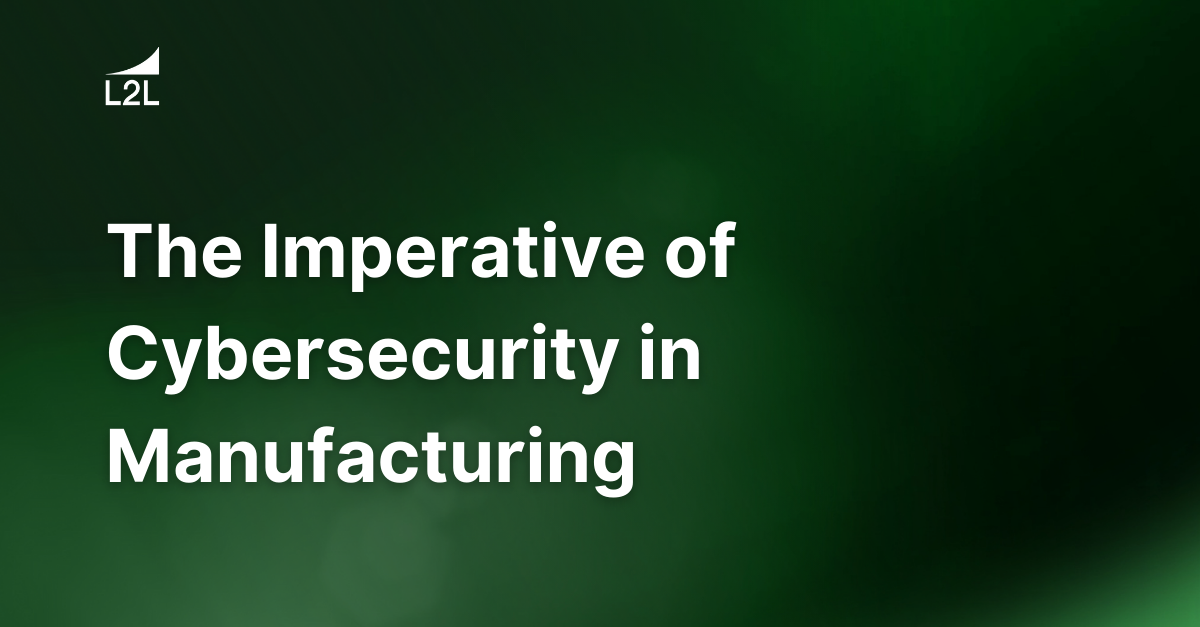
As the manufacturing sector accelerates its digital transformation and embraces technologies like artificial intelligence (AI) and machine learning (ML), the imperative to safeguard this digital evolution has never been more critical. At L2L, we recognize that our role extends beyond providing production and maintenance solutions. It also encompasses a robust commitment to cybersecurity.
In this post, we’ll explore the importance of security in modern manufacturing and how the L2L Connected Workforce Platform ensures robust protection in an increasingly digital landscape.
The importance of manufacturing cybersecurity
Today, manufacturing operations are intricately tied to digital processes; therefore, the security of manufacturing data is paramount. While digital transformation increases operational efficiency, it also makes companies more vulnerable to cyberattacks. A breach or compromise in these data sources can lead to catastrophic operational disruptions and significant financial losses.
In manufacturing, security is often seen as secondary and non-strategic. But in the age of digital manufacturing, this perspective needs a drastic shift in response to increasing attacks like the 50% increase in ransomware attacks against manufacturers, utilities, and other industrial companies in 2023.
Security programs aren’t just another line item on the IT budget. They’re essential investments that protect against system disruptions, data loss, and the consequent downtime and productivity drops. At L2L, we view security as a prerequisite for maintaining high productivity and operational continuity.
The future of cybersecurity in manufacturing
As we look to the future, several trends identified by Gartner highlight the evolving landscape of cybersecurity in manufacturing.
Trend 1: The rise of generative AI (GenAI)
While GenAI promises significant operational enhancements, it also introduces new vulnerabilities. L2L proactively collaborates with stakeholders to harness GenAI safely and securely, ensuring that these powerful tools augment our solution capabilities without compromising them.
Trend 2: Cybersecurity metrics and boardroom impact
The increasing adoption of outcome-driven metrics (ODMs) helps connect cybersecurity investments to actual protection levels. This alignment is crucial for justifying cybersecurity expenditures and demonstrating their impact on reducing operational risks.
Trend 3: Enhancing human-centric security practices
Recognizing that human error remains a significant vulnerability, L2L emphasizes security behavior and culture programs (SBCPs) to minimize risks associated with unsecure employee behavior. These programs are designed to foster a security-minded culture across all levels of the organization.
Trend 4: Third-party cybersecurity risk management
With the inevitability of third-party risks, L2L focuses on resilience-driven strategies to manage these threats, including establishing robust incident response plans and maintaining continuous threat exposure management.
Trend 5: Identity and access management (IAM)
As we adopt an identity-first approach to security, strengthening IAM becomes central to our cybersecurity strategy. This approach ensures that access controls and identity management are comprehensive enough to meet unique customer requirements, minimizing potential breaches and enhancing overall security posture.
L2L’s commitment to data security
At L2L, we’re deeply committed to securing customer data and ensuring compliance across challenging regulatory environments. We provide the highest level of security in the connected frontline worker space, including:
-
SOC 2 Type 2 compliance: This standard ensures that L2L's systems and processes are designed to keep clients’ sensitive data secure.
-
NIST 800-171 compliance: For our customers engaged with the U.S. government, this compliance standard means they can trust us with defense-related information.
-
Industry-specific compliance programs: From CFR 21 Part 11 for the food and pharmaceutical industry to specific requirements for the automotive industry, we ensure our solutions meet critical compliance standards across sectors.
-
Region-specific compliance: European customers face increasing data sovereignty and privacy regulations like GDPR. In the US, similar privacy regulations, like the California Consumer Privacy Act (CCPA), impose specific requirements on manufacturers.
Looking ahead: A strategic approach to cybersecurity
L2L leads the way in helping major manufacturers adapt to the changing cybersecurity challenges. With our advanced security measures and compliance capabilities, we’re well-equipped to protect our customers against emerging threats. Integrating cybersecurity deeply into our operational fabric not only safeguards our technological advancements but also supports the overall success and resilience of the manufacturing sector.
In embracing these challenges, L2L isn't just responding to a trend; we're actively shaping a secure future for digital manufacturing. Our commitment to robust, comprehensive cybersecurity practices ensures that as the manufacturing industry evolves, it does so securely, protecting both the integrity of operations and the trust of our customers.
Learn more about L2L by booking a demo with one of our manufacturing experts or contacting us at sales@l2l.com.
Revisions
Original version: 3 June 2024
Written by: Tyler Whitaker
Reviewed by: Daan Assen
Please read our editorial process for more information
Related Posts
Subscribe to Our Blog
We won't spam you, we promise. Only informative stuff about manufacturing, that's all.



